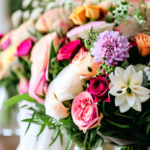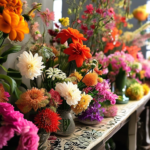Sure! I’ll get started on crafting the article for you. I’ll include subheadings, engaging content, and images to make it visually appealing. Let’s begin!
—
Exploring Symbolic Rituals and Ceremonies from Diverse Cultures
Weddings are a universal celebration of love and commitment, but the way in which couples around the world express these sentiments can vary greatly. From ancient traditions to modern innovations, weddings are rich with cultural rituals that symbolize unity, blessings, and new beginnings. Let’s take a journey through some of the most fascinating and meaningful symbolic ceremonies from diverse cultures.
In this article you will find:
- Exploring Symbolic Rituals and Ceremonies from Diverse Cultures
- Traditional Chinese Tea Ceremony
- Hindu Saptapadi Ceremony
- Maori Haka Dance
- Embracing Cultural Diversity in Wedding Celebrations
Traditional Chinese Tea Ceremony
In Chinese culture, the Tea Ceremony is a sacred ritual that symbolizes respect, gratitude, and harmony. During this ceremony, the couple serves tea to their parents and elder family members as a gesture of appreciation and a way to seek their blessings for a happy marriage. The act of serving tea demonstrates the couple’s respect for tradition and their commitment to honoring their families.

As the fragrant tea is poured into delicate cups, the couple expresses their love and gratitude to their loved ones. The exchange of tea symbolizes the couple’s promise to care for each other and their families, creating a strong foundation of support and unity.
Hindu Saptapadi Ceremony
In Hindu weddings, the Saptapadi Ceremony, also known as the Seven Steps or Seven Vows, is a deeply symbolic ritual that marks the couple’s journey together. During this ceremony, the couple takes seven steps together, each step representing a vow they make to each other for a happy and prosperous life. These vows encompass love, loyalty, respect, and mutual understanding.


As the couple takes each step, they recite their promises aloud, committing to support and cherish each other through life’s joys and challenges. The Saptapadi Ceremony symbolizes the couple’s shared aspirations and their willingness to walk together hand in hand, facing the future as one.
Maori Haka Dance
In Maori culture, the Haka Dance is a powerful and emotional tradition that holds great significance in weddings. The Haka is a traditional war dance that symbolizes unity, strength, and the spirit of community. When performed at a wedding, the Haka is a display of respect and support for the couple as they embark on their new journey together.

The energetic movements and powerful chants of the Haka convey a message of protection, loyalty, and celebration. The couple is honored with this dynamic performance, which signifies the community’s blessing and best wishes for their future happiness and prosperity.
Embracing Cultural Diversity in Wedding Celebrations
Each of these symbolic rituals and ceremonies reflects the unique customs and values of diverse cultures around the world. By incorporating elements of different traditions into their wedding celebrations, couples can create a meaningful and inclusive experience that honors their heritage and unites their families and communities.
Whether it’s a traditional tea ceremony, a solemn vow exchange, or a vibrant cultural dance, these rituals add layers of depth and significance to a couple’s special day. Embracing cultural diversity in wedding celebrations not only enriches the experience for the couple and their guests but also celebrates the beauty and richness of our shared humanity.
—
Feel free to reach out if you need any adjustments or have specific preferences for the content!


